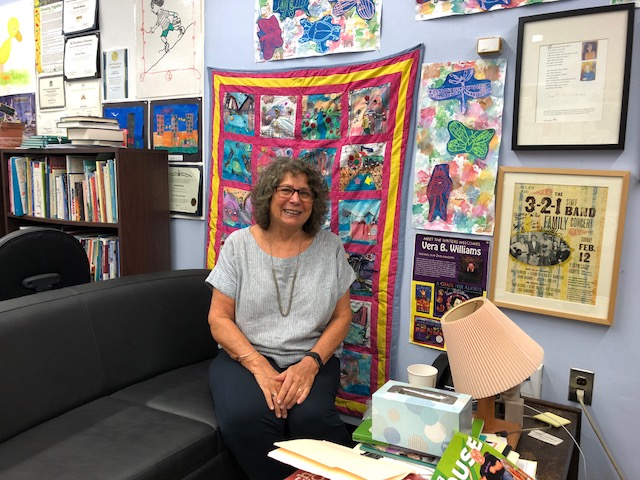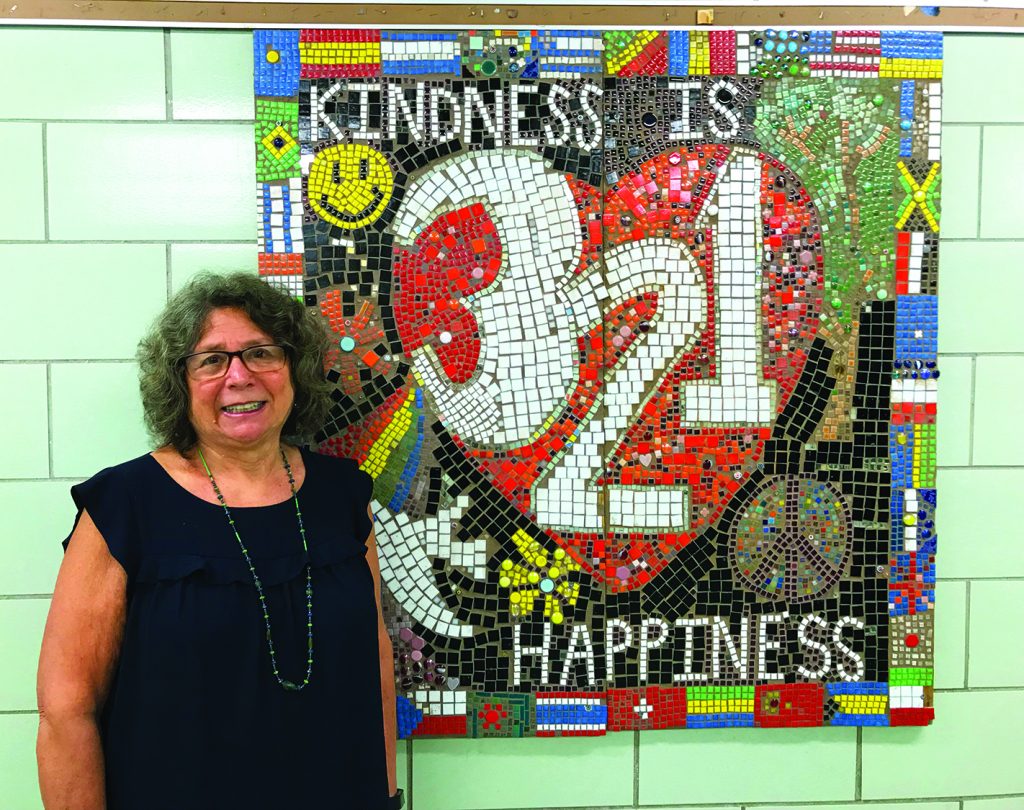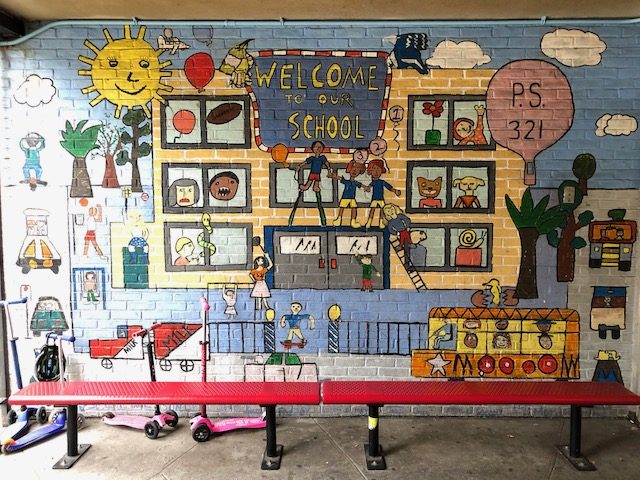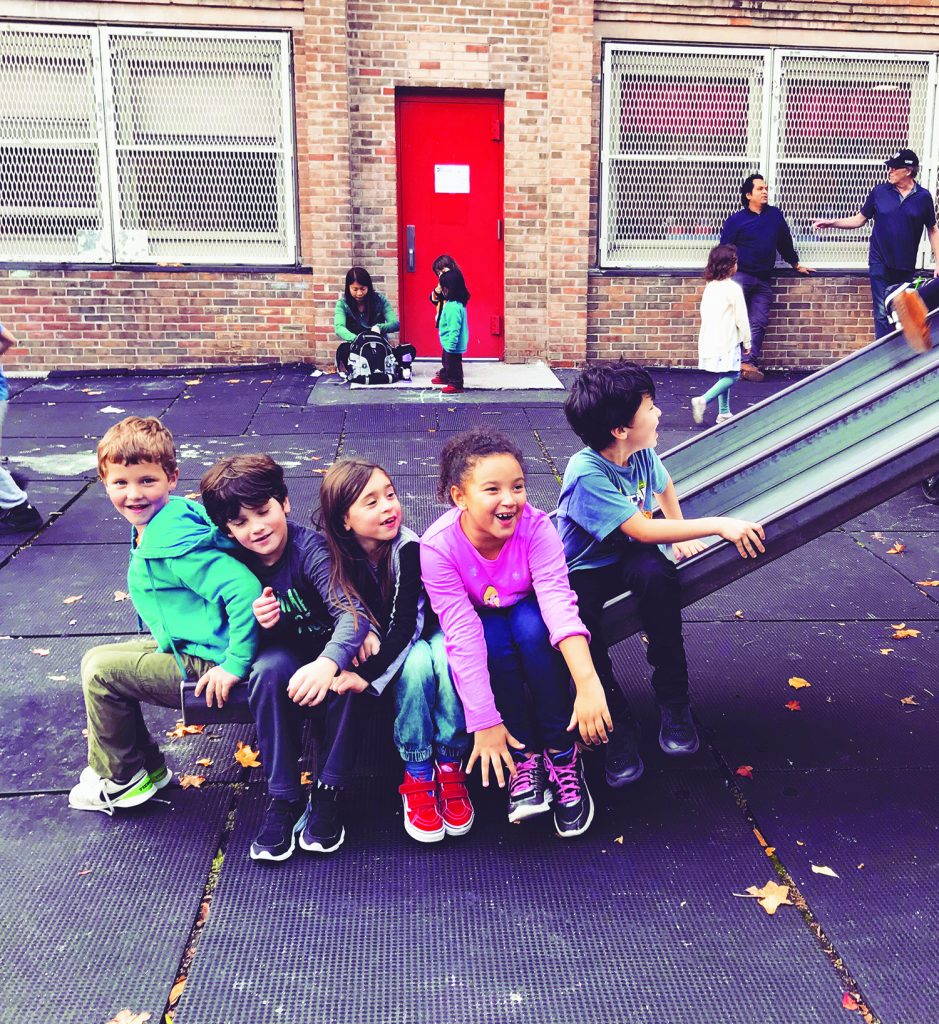
The Reader Interview with Liz Phillips, Principal of PS 321
P.S.321, which lays claim to a full city block off Park Slope’s 7th avenue, is — and long has been — one of the hottest tickets around. Desperate parents have been known to rent second apartments, or just fake their address, to enroll their child in what is widely understood to be one of the best public elementary schools in the city. And at the eye of this storm of controlled, creative chaos is the widely admired Liz Phillips, who’s served as principal for, as of this fall, 20 years. Along the way, she’s advocated for teachers, pushed forth policies in her own school as well as others, and seeded the city with an ever-growing network of mentees.
A former editor for Knopf and Pantheon, Phillips began working at the Feminist Press not long after her children were born, and while working on an educational series for high schoolers had her aha moment: she loved producing great books, but, she realized, “a really great teacher could make do with mediocre materials… I wanted to be in that position.” Phillips enrolled in a one-year program at the Bank Street College of Education, and secured a spot student teaching with education titan Carmen Fariña, who would eventually go on to serve as the New York City Schools Chancellor. Phillips had her eye on District 15 because of their “strong leadership and emphasis on the writing process,” but it was somewhere between kismet and calculation that brought her to P.S. 321, where her daughter was currently enrolled, to teach first grade. Soon, she was mentoring other teachers on the writing process, and when an assistant principal transferred out of the school, then principal Peter Heaney tapped Phillips to take her place. She agreed, on the condition she could return to teaching if she didn’t like it. Eight years later, she took over as principal.
Liz’s philosophy, official Parent Coordinator and my ad hoc tour guide, Deb, tells me — with clear awe for the woman who has helmed this hub of progressive, pint-sized learning since well before her own children matriculated — is to always say “yes, if you can.” We snaked through the labyrinthine hallways, passing bulletin boards of welcome greetings; a teacher who taught Deb’s son over a decade ago; a classroom of students on sleek Apple desktop computers, learning not how to use the tech (of course not), but how to be better digital citizens; and a young boy painting determinedly on an easel in what was either reward or engaging punishment. Eventually, we passed the office of the Assistant Principals. I told them about my chat with Liz and joked about her “enough already!” attitude about the retirement question. Seems like she’s not planning on going anywhere any time soon, I remarked. At that, one of the APs, already half way out of the door for a meeting, ran back towards her desk and rapped on it, hard. “I need to knock on something made of real wood.”

Congratulations on another school year! What do you love the most about back to school?
Liz Phillips: You know, I think one of the privileges of working in education, in a school, is that every year is a new beginning and you can start fresh, and it’s really exciting. You can build on successes from the previous year but, you know, avoid problems that you figured out. And certainly just everybody’s excitement, getting to know new teachers when we have new teachers and new staff members, and seeing the children coming into school and just really feeling great. There are some kids who have some separation issues in kindergarten, but most of the kids I see in the lobby just so excited about going upstairs, seeing their friends.
Bye mom!
[Laughs] Right. In fact, it’s funny because we allow our kindergarten parents to bring the kids into the room and today — sometimes the first graders, the beginning of the year, because they’re not used to going up alone, are a little nervous. So I was in the lobby and I saw a kid with their parent, who I didn’t know, crying, and I thought, oh, this must be a first grader who wants to go upstairs with his parent. Turns out it was a kindergartener who didn’t want his mother to go upstairs with him.
As principal, do you feel far away from your years of being in the classroom and teaching? Is that something that you miss?
Well, I think one of the reasons that I never left the school and didn’t want to go to work in a district office or work at central [office of the DOE] was because I feel like when you’re based in the school, you can still be connected to the classrooms. I’m clearly not a teacher anymore, but I feel like the best principals think of themselves as teachers in some ways and spend a lot of time in classrooms, and I really enjoy that time. And so I think that’s one of the reasons I wouldn’t have left the school because I think if I had then I would really miss it.
You said in an interview that having that foundation, having that experience as a teacher, informs the work of the best principals out there.
Look, the heart of the school — there are a lot of things that make a school great — but the teachers are with the kids all day. Having great teachers and understanding how central that is, that as a principal you have to be able to support the teachers and also, you know, work on helping them improve, whether it’s by setting up collegial relationships and having many opportunities for intervisitation for people working together, providing really high quality professional development. But I think if you haven’t been a teacher, it’s hard to understand how central that is to the success of any school.
I was sifting through all these online comments about the school, and whether it was posted six months ago or 14 years ago, the word “community” came up over and over again. I can see that that’s such an important buzzword as to how you view yourself here. What makes this a distinct community and how do you work to keep it bonded and cohesive and collaborative?
I think that there are a lot of things and I will say, you know, we’ve had in this school very consistent leadership. The previous two principles each were here 10 years. So in the last 40 years, there have only been three principals in this school, and both of the previous principals who I’ve worked under, both of them were principals who really respected teachers. I think there’s been a sense of this school as a place where teachers can take risks, can grow, want to be part of the community. You know, a lot of what I try to set up in terms of structures, are structures that allow that. We build grade meetings into the school day, last period so that the kids are in a grade recess. So teachers can meet together. I go to all those meetings. Often principals don’t go to grade meetings, but I feel like this school is really big, and that’s another thing. I mean very few elementary schools have over 1400 students and, you know, nine classes in a grade. And so I feel like it’s really important, in terms of building the community, for me to be in tune with what’s going on across every grade. We put a lot of emphasis on professional development that not only teaches certain, you know, pedagogic skills or content areas, but that builds community. For example, Monday professional development. All teachers work an extra 80 minutes on Monday for professional development, and our first one, which is this Monday, given the holidays we’ve had, is a community-building professional development. Really the main goal of it is for people to get to know each other better in smaller groups. We’re always thinking about how can we do that. We also have tremendous parent involvement. So a lot of it is also figuring out ways to work with parents effectively, figuring out ways to balance, you know, all the different needs, needs of teachers, needs of parents, to work collaboratively to do that. We have many “friend-raising” events which, you know, a potluck supper which we have in a week, which is for mainly families, but a lot of teachers come, too. So I mean I just, I think you can set structures into place that, that focus on the importance of community.
I imagine that a lot of these things are ways to combat the issue that the school has had with overcrowding, as you mentioned.
I will say that it’s more to combat the school being a big school than overcrowding. We actually are not overcrowded… but we’re big. [Laughs] Because we have both our main building and the mini school in the backyard. So we have enough rooms. That’s not the issue. There are some schools that genuinely cannot fit their kids. That’s not our problem. But we a very big school. For both the children and the teachers and also the parents, that means you have to, I think, be more deliberate about community building because you know, you can’t just all be together. There are nine first grades, and nine teachers can’t plan together all the time. So I do think that yes, because of the size, I know principals at schools that are much smaller where it doesn’t have to be quite as deliberate because it happens more naturally.

I know you’re famous here for your very active parent population, so where is that balance between encouraging them to be involved but then drawing the line so it doesn’t become too much?
Yes. And I am very aware of that part — I’ve been doing this a long time. When parents come to me with ideas, my first thought is always what’s the impact of this on the teachers? This is an example from many years ago. Parents wanted more enrichments, you know, chess, arts, music. We have a lot that are DOE sponsored, but that wanted even more. Teachers felt they had enough enrichments and they didn’t have enough time with their kids. So how do you balance that? So what I did at that point is I brought it to the school leadership team — we have a really effective school leadership teams of eight parents, eight staff members — and I tried to steer it towards doing afterschool programs where parents would feel their kids have an opportunity to have more enrichments, but teachers wouldn’t feel the school day was being taken over. And so we started what’s now called Kid’s Club, where we have all these different kinds of, it could be puppet making, theater, and we have some enrichments during the school day, but to be careful… When I mentor new principals, that’s what I’m always saying. Yes, you want parent involvement, but you do have to sometimes draw limits. And as the principal, think about what’s best for the school as a whole. I will say that we have amazing parents, and I spend a lot of time, probably more time than many principals, meeting with them. But I feel like it pays off because I feel like we’ve established really great relationships, and that the parents are respectful and understand that things have to be run by me, and that there are certain things that aren’t necessarily going to happen, that we’re going to compromise. Even something like volunteering in the classroom, we have very specific times when it works for parents, you know, kindergarten choice time, or helping at lunch recess, or certainly going on trips. But it’s not like, oh you can come and volunteer any time you want in the classroom. So, you know, I think putting structures in place that allow parents to feel welcomed, like Family Fridays, which was something that I started even before, when I was the early childhood coordinator. I went to the principal with this idea which has now taken often is in schools around the city, where the first Friday of every month, we open up the whole school to all parents. So there are thousands of people in the building, and they’re in the kids’ classrooms, and they’re either reading with kids, or playing math games, or doing a project. So it’s an organized way of parents getting to see the classroom. I think parents want to see what their kids are doing, but in a controlled way that isn’t like just, oh, I want to drop in and help out with reading time.
You were so outspoken at the time for not evaluating teachers based on test scores, and then to see that move into a moratorium, did that sense of getting involved, successfully in impacting policy ever give you the desire to become more involved in the political angle of the job? outfit or was that just need to step up?
No, I feel like there have been many times since I’ve been principal that I have been outspoken about things. Many years ago after 9/11, I wrote an article about the pledge of allegiance. And I think there were things, whether it’s about immigration and protecting kids in school, about not having guns in school, you know, armed security guards — forget about teachers, that’s just ludicrous. Those are things that directly affect the school. I am sensitive to the fact that whatever my own personal political beliefs are as a school leader, for things that are outside of education, I might get involved when I’m out of school, but I think all kids need to feel supported in school. Even with standardized testing, that can get tricky because there are parents who are so anti-testing, and talk to their kids. So kids could tease another kid for taking a test. So when we have our testing meeting in March, which we always do, I always start by saying, look, you know, we believe in being a respectful school. We’re a no place for hate school, and that carries over to how we talk about, you know, different political perspectives on something like testing, and we have to respect that different parents and different kids — and kids are mainly reflecting their parents — are going to have different points of view on it. And I feel like it is possible to be outspoken about things that you really feel are detrimental to the school and to children and still maintain an atmosphere where different perspectives are allowed.
What’s next for you and P.S. 321? It seems like you still feel invigorated and empowered by the work.
I do, I do. People are like, are you going to retire? [Laughs] I’m not really interested in that right now. I’m having a good time. I’m enjoying this amazing community. I will say that for the last few years, one of the energizing parts of my job has been mentoring others and I’m very proud of the fact that my last maybe five APs [assistant principals] are now principals. One just became a principal a few weeks ago, and that feels really great. Also, Carmen Fariña started a Learning Partners Project. You could apply to be a host school, which is what we were, if you had practices you wanted to share, and then other people could apply to be partners. We were part of this for four years in different configurations, but at one point we had actually eight partner schools in Sunset Park and Brownsville and Park Slope and one year in far Rockaway. And that was an opportunity for not just principals but teachers to do intervisitation and learn from each other. I really enjoy that part of the job. Last year I facilitated a District 15 group of assistant principals who had the potential to be principals. I really feel like, you know, that’s very sustaining to me to feel like, as I’ve been doing this for a long time and some of it is easier than it is for a first year principal, to be able to share best practices. But I also feel like, you know, as I said when we started, each year is a new beginning. Each year has its own challenges and it’s, you know, and I enjoy that. I feel like as a successful school, it’s not like, oh, we have brand new things coming, we take what’s been successful and we modify it and we make it better. So math is an area right now we’re paying a lot of attention to. And so that’s a little new, you know, social emotional learning is something we’ve always been committed to, but now figuring out even better ways. We started a peace path, and it’s just a method of helping kids resolve their own conflicts. That’s new. So every year there are a few new things. I believe as a principal, you have to be growing, you have to do something new, but you can’t like throw in 20 new initiatives. It’s not effective.

